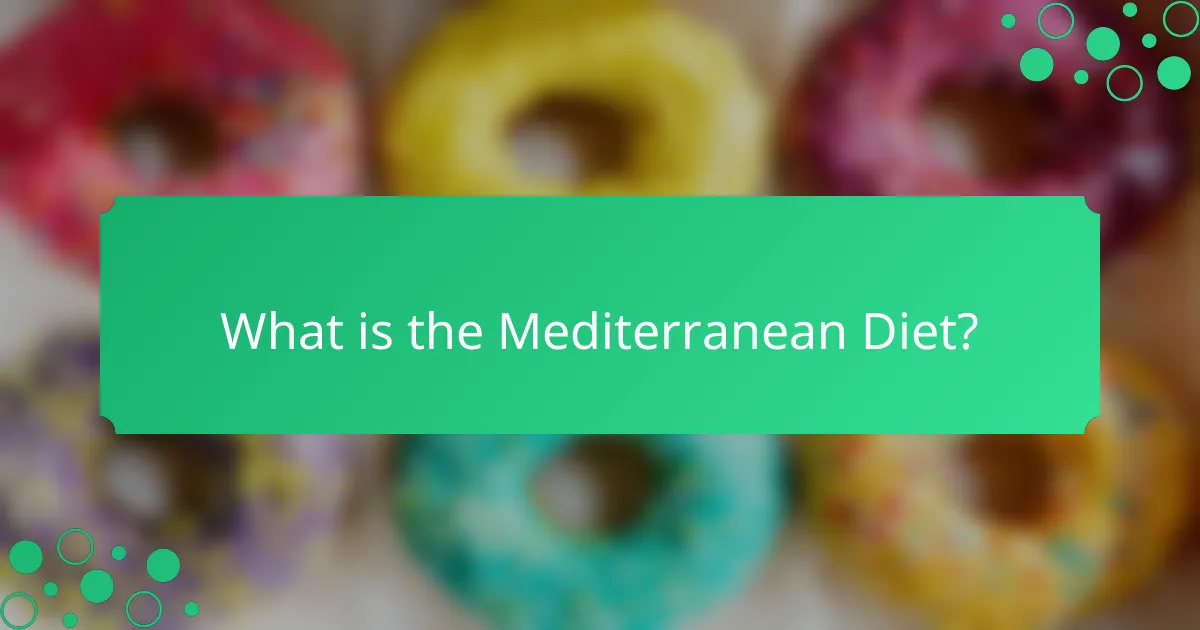The Mediterranean Diet is a dietary pattern characterized by the traditional eating habits of countries bordering the Mediterranean Sea. It focuses on whole foods such as fruits, vegetables, whole grains, legumes, nuts, and olive oil, while promoting moderate consumption of fish and poultry and limiting red meat and dairy. This diet is linked to numerous health benefits, including a reduced risk of chronic diseases, improved heart health, and enhanced mental well-being. Key culinary practices involve the use of olive oil, a variety of fresh produce, and communal eating, which fosters social connections and enjoyment of food. Overall, the Mediterranean Diet supports a balanced lifestyle that contributes to longevity and quality of life.

What is the Mediterranean Diet?
The Mediterranean Diet is a dietary pattern inspired by the traditional eating habits of countries bordering the Mediterranean Sea. It emphasizes the consumption of fruits, vegetables, whole grains, legumes, nuts, and olive oil. This diet includes moderate intake of fish and poultry, while limiting red meat and dairy products. Research indicates that this diet is associated with a lower risk of chronic diseases. Studies show it can improve heart health and reduce the risk of stroke. Additionally, the Mediterranean Diet promotes a balanced intake of nutrients. Its principles encourage social and family gatherings around meals, enhancing overall well-being.
How did the Mediterranean Diet originate?
The Mediterranean Diet originated from the traditional eating patterns of countries bordering the Mediterranean Sea. It was influenced by the agricultural practices and food availability in these regions. Key components include fruits, vegetables, whole grains, legumes, and healthy fats like olive oil. Historical studies indicate that this diet has roots in ancient Greek and Roman civilizations. The diet gained recognition in the 20th century for its health benefits, particularly in heart health. Research published in the New England Journal of Medicine highlighted its role in reducing cardiovascular disease. The Mediterranean Diet emphasizes moderation and variety, reflecting the cultural heritage of the Mediterranean people.
What are the historical influences on the Mediterranean Diet?
The Mediterranean Diet is influenced by various historical factors. Ancient civilizations, such as the Greeks and Romans, shaped its foundational aspects. They emphasized the consumption of local, seasonal foods. The agricultural practices of these civilizations prioritized grains, fruits, and vegetables. Trade routes established during the Roman Empire introduced new ingredients like spices and olive oil. The spread of [censured] in the Middle Ages also impacted dietary habits, promoting the use of fruits and nuts. Additionally, the Renaissance revived interest in classical cuisine, further enriching the diet. Historical events, such as colonization, brought diverse culinary influences from other regions. These influences collectively contributed to the Mediterranean Diet’s evolution into a balanced and healthful way of eating.
How does geography impact the Mediterranean Diet?
Geography significantly impacts the Mediterranean Diet by influencing the availability of local ingredients. Different regions in the Mediterranean have distinct climates, which affect crop production. For example, coastal areas produce a variety of seafood, while inland regions focus on grains and legumes. The Mediterranean climate, characterized by hot, dry summers and mild, wet winters, supports the growth of olive trees and grapevines. This results in the widespread use of olive oil and wine in the diet. Additionally, cultural practices shaped by geography lead to unique culinary traditions. For instance, the use of spices and herbs varies by region, reflecting local agricultural practices. This geographical diversity contributes to the richness and variety of the Mediterranean Diet.
What are the key components of the Mediterranean Diet?
The key components of the Mediterranean Diet include fruits, vegetables, whole grains, legumes, nuts, and olive oil. This diet emphasizes plant-based foods and healthy fats. Fish and poultry are preferred over red meat. Dairy products, mainly yogurt and cheese, are consumed in moderation. The diet also includes herbs and spices for flavor instead of salt. Wine is often consumed in moderation, typically with meals. Research shows that this diet can reduce the risk of heart disease and promote longevity. The Mediterranean Diet is associated with lower rates of chronic diseases, according to studies published in the New England Journal of Medicine.
What types of foods are included in the Mediterranean Diet?
The Mediterranean Diet includes a variety of foods that promote health and well-being. Key components are fruits, vegetables, whole grains, legumes, nuts, and seeds. Olive oil is the primary source of fat. Fish and seafood are emphasized, while poultry and dairy are consumed in moderation. Red meat is eaten sparingly. Herbs and spices replace salt for flavoring. This diet is rich in antioxidants and healthy fats, contributing to its health benefits. Studies show that adherence to the Mediterranean Diet is linked to lower risks of chronic diseases.
How are meals typically structured in the Mediterranean Diet?
Meals in the Mediterranean Diet are typically structured around several key components. Breakfast often includes fruits, whole grains, and dairy. Lunch usually features vegetables, legumes, and healthy fats like olive oil. Dinner is commonly lighter, focusing on fish or poultry with grains and vegetables. Snacks may consist of nuts or yogurt. This meal structure emphasizes fresh, seasonal ingredients and balanced portions. The Mediterranean Diet encourages communal eating, enhancing social connections during meals. Research indicates that this dietary pattern supports heart health and reduces chronic disease risk.
Why is the Mediterranean Diet considered beneficial?
The Mediterranean Diet is considered beneficial due to its emphasis on whole foods and healthy fats. This diet primarily includes fruits, vegetables, whole grains, fish, and olive oil. Research indicates that these components contribute to lower risks of heart disease and stroke. A study published in the New England Journal of Medicine found that participants following this diet had a 30% lower risk of cardiovascular events. Additionally, the diet is associated with improved cognitive function and reduced incidence of Alzheimer’s disease. These benefits stem from the high levels of antioxidants and anti-inflammatory properties found in Mediterranean foods. Overall, the Mediterranean Diet promotes long-term health and well-being.
What nutritional principles underpin the Mediterranean Diet?
The Mediterranean Diet is based on several key nutritional principles. It emphasizes whole, minimally processed foods. Fruits, vegetables, whole grains, and legumes are staples. Healthy fats, particularly olive oil, are preferred. The diet includes moderate consumption of fish and poultry. Red meat is limited, while dairy is consumed in moderation. Herbs and spices replace salt for flavoring. This diet is rich in antioxidants and healthy fats, promoting heart health. Research indicates that adherence to this diet can reduce the risk of chronic diseases.
How does the Mediterranean Diet compare to other dietary patterns?
The Mediterranean Diet emphasizes whole foods, healthy fats, and plant-based ingredients. It differs from other dietary patterns by promoting olive oil as a primary fat source. This diet is rich in fruits, vegetables, whole grains, and legumes. It also includes moderate consumption of fish and poultry. In contrast, many Western diets are high in red meat and processed foods. Studies show that the Mediterranean Diet is linked to lower risks of heart disease and stroke. Research published in the New England Journal of Medicine found a significant reduction in cardiovascular events among adherents. This evidence supports the Mediterranean Diet’s health advantages over other dietary patterns.
What are the health benefits associated with the Mediterranean Diet?
The Mediterranean Diet offers numerous health benefits. It is associated with reduced risk of heart disease. Studies indicate that it lowers cholesterol levels and improves blood pressure. This diet emphasizes fruits, vegetables, whole grains, and healthy fats. These components contribute to better weight management. Research shows that it may also reduce the risk of type 2 diabetes. Additionally, the Mediterranean Diet is linked to improved cognitive function. A study published in the journal “Neurology” found it may lower the risk of Alzheimer’s disease. Overall, the Mediterranean Diet promotes long-term health and well-being.
How does the Mediterranean Diet affect cardiovascular health?
The Mediterranean Diet positively affects cardiovascular health. It is rich in fruits, vegetables, whole grains, and healthy fats. These components help lower bad cholesterol levels. The diet also emphasizes fish, which is high in omega-3 fatty acids. Omega-3s are known to reduce inflammation and lower blood pressure. Studies show that adherence to this diet can decrease the risk of heart disease. For instance, a study published in the New England Journal of Medicine found a 30% lower risk of cardiovascular events among participants following the Mediterranean Diet. Overall, the Mediterranean Diet promotes heart health through its nutrient-dense foods and healthy fat sources.
What role does the Mediterranean Diet play in weight management?
The Mediterranean Diet aids in weight management by promoting balanced eating patterns. This diet emphasizes whole foods like fruits, vegetables, whole grains, and healthy fats. Research indicates that adherence to this diet can lead to significant weight loss and improved metabolic health. A study published in the journal ‘Obesity’ found that participants following the Mediterranean Diet lost more weight compared to those on low-fat diets. The diet’s focus on nutrient-dense foods helps control hunger and reduces the likelihood of overeating. Additionally, the Mediterranean Diet encourages physical activity, which further supports weight management efforts.

How does the Mediterranean Diet promote overall well-being?
The Mediterranean Diet promotes overall well-being through its emphasis on whole foods and healthy fats. This diet is rich in fruits, vegetables, whole grains, and lean proteins. It includes healthy fats primarily from olive oil, which can reduce inflammation. Research indicates that this diet is associated with lower risks of heart disease and stroke. A study published in the New England Journal of Medicine found that participants following the Mediterranean Diet had a 30% lower risk of cardiovascular events. Additionally, the diet supports mental health by providing nutrients that enhance brain function. Overall, the Mediterranean Diet fosters a balanced lifestyle that contributes to longevity and improved quality of life.
What psychological benefits are linked to the Mediterranean Diet?
The Mediterranean Diet is linked to several psychological benefits. Research indicates that this diet can reduce symptoms of depression and anxiety. A study published in the journal “Nutritional Neuroscience” found that individuals adhering to the Mediterranean Diet reported lower levels of depressive symptoms. The diet’s emphasis on whole foods, healthy fats, and antioxidants contributes to improved mood and cognitive function. Additionally, social aspects of Mediterranean meals, such as shared dining experiences, enhance emotional well-being. Overall, the Mediterranean Diet supports mental health through its nutritional composition and lifestyle practices.
How does social interaction influence the Mediterranean Diet experience?
Social interaction significantly enhances the Mediterranean Diet experience. Shared meals foster community and strengthen relationships. This social aspect encourages individuals to enjoy food in a relaxed environment. Research indicates that dining with others can lead to healthier eating habits. For example, studies show that people tend to consume more fruits and vegetables when eating in groups. The Mediterranean Diet emphasizes communal eating, which aligns with cultural practices in Mediterranean regions. This cultural context promotes a holistic approach to food, integrating nutrition with social well-being. Ultimately, social interactions enrich the Mediterranean Diet, making it not just a dietary choice but a lifestyle.
What impact does the Mediterranean Diet have on mental health?
The Mediterranean Diet positively impacts mental health. Research indicates that adherence to this diet is associated with a reduced risk of depression and anxiety. The diet’s emphasis on fruits, vegetables, whole grains, and healthy fats contributes to improved brain function. Specific nutrients, such as omega-3 fatty acids found in fish, support cognitive health. A study published in the journal “Nutritional Neuroscience” found that individuals following the Mediterranean Diet reported better mood and mental well-being. Additionally, the diet’s anti-inflammatory properties may play a role in reducing mental health symptoms. Overall, the Mediterranean Diet promotes a balanced approach to nutrition that supports mental health.
How can individuals adopt the Mediterranean Diet?
Individuals can adopt the Mediterranean Diet by incorporating more fruits, vegetables, whole grains, legumes, and healthy fats into their meals. They should prioritize olive oil as the main source of fat. Including fish and poultry regularly while reducing red meat consumption is essential. Dairy products should be consumed in moderation, primarily as cheese and yogurt. Individuals should also enjoy meals with family and friends, emphasizing social connections. Research shows that this diet can lower the risk of heart disease and improve overall health. The Mediterranean Diet promotes a balanced approach to eating, focusing on nutrient-rich foods.
What practical steps can be taken to transition to the Mediterranean Diet?
To transition to the Mediterranean Diet, start by increasing your intake of fruits and vegetables. Aim for at least five servings daily. Incorporate whole grains such as brown rice and whole wheat bread. Replace red meat with fish and poultry, focusing on fatty fish like salmon. Use olive oil as your primary fat source instead of butter or margarine. Include nuts and seeds in your snacks and meals for healthy fats. Limit processed foods and added sugars, focusing instead on fresh, whole ingredients. Drink water as your main beverage, and enjoy moderate amounts of red wine, if desired. Research shows that the Mediterranean Diet is linked to numerous health benefits, including reduced risk of heart disease and improved longevity.
What resources are available for learning Mediterranean cooking?
Books, online courses, and cooking classes are available for learning Mediterranean cooking. Popular books include “Mediterranean Cooking” by Nancy Harmon Jenkins and “The Mediterranean Table” by Amy Riolo. Online platforms like MasterClass and Udemy offer structured courses on Mediterranean cuisine. Local culinary schools often provide hands-on classes focused on Mediterranean dishes. Additionally, YouTube channels dedicated to Mediterranean cooking provide free video tutorials. Cooking blogs also share recipes and techniques specific to Mediterranean cuisine. These resources collectively offer a comprehensive approach to mastering Mediterranean cooking.

What culinary practices are integral to the Mediterranean Diet?
The Mediterranean Diet emphasizes fresh, whole foods and traditional cooking methods. Key culinary practices include using olive oil as the primary fat source. This oil is rich in monounsaturated fats and antioxidants. Another practice is consuming a variety of fruits and vegetables, which provide essential vitamins and minerals. Whole grains, such as barley and farro, are staples in meals. Legumes, like lentils and chickpeas, are often included for protein. Fish and seafood are favored over red meat, promoting heart health. Meals are typically seasoned with herbs and spices instead of salt. Finally, communal eating is encouraged, fostering social connections and enjoyment of food.
How is food prepared in the Mediterranean Diet?
Food in the Mediterranean Diet is prepared using fresh, whole ingredients. Common methods include grilling, roasting, and sautéing. These techniques preserve the natural flavors and nutrients of the food. Olive oil is a primary fat used for cooking and dressing. Herbs and spices enhance flavor without excessive salt. Seasonal and local produce is emphasized for freshness. Fish and poultry are preferred over red meat. Meals are often enjoyed in a communal setting, promoting social interaction. This culinary approach aligns with the diet’s health benefits, supporting heart health and weight management.
What cooking methods are preferred in Mediterranean cuisine?
Mediterranean cuisine primarily prefers cooking methods such as grilling, roasting, and sautéing. Grilling enhances the natural flavors of meats and vegetables. Roasting is commonly used for dishes like vegetables and fish, providing a rich, caramelized taste. Sautéing allows for quick cooking while preserving the nutrients in ingredients. These methods align with the Mediterranean diet’s emphasis on fresh, high-quality ingredients. Studies show that these cooking techniques help retain the health benefits of the foods, such as antioxidants and healthy fats.
How does seasonality influence ingredient choices in the Mediterranean Diet?
Seasonality significantly influences ingredient choices in the Mediterranean Diet. This diet emphasizes fresh, locally sourced produce, which varies throughout the year. Seasonal ingredients are often more flavorful and nutrient-dense. For example, tomatoes are abundant in summer, while root vegetables are harvested in fall. Local markets reflect these seasonal changes, offering a variety of fresh options. This practice supports sustainable agriculture and reduces carbon footprints. Additionally, traditional Mediterranean cuisine adapts recipes based on seasonal availability. This not only enhances taste but also promotes dietary diversity. The Mediterranean Diet’s reliance on seasonal ingredients contributes to its health benefits and culinary richness.
What are some popular dishes in the Mediterranean Diet?
Popular dishes in the Mediterranean Diet include Greek salad, hummus, and ratatouille. Greek salad features tomatoes, cucumbers, olives, and feta cheese. Hummus is a spread made from chickpeas, tahini, lemon juice, and garlic. Ratatouille is a vegetable stew that includes zucchini, eggplant, and bell peppers. Other notable dishes are tabbouleh, a parsley and bulgur salad, and moussaka, a layered eggplant dish. The Mediterranean Diet emphasizes fresh, whole ingredients and healthy fats like olive oil. These dishes reflect the diet’s focus on plant-based foods and lean proteins.
What are the signature flavors and ingredients in these dishes?
The signature flavors and ingredients in Mediterranean dishes include olive oil, fresh vegetables, herbs, and seafood. Olive oil serves as a primary fat source, providing a rich, fruity flavor. Fresh vegetables like tomatoes, bell peppers, and cucumbers contribute vibrant tastes and textures. Herbs such as basil, oregano, and parsley enhance the dishes with aromatic notes. Seafood, particularly fish, offers a clean and briny flavor profile. Whole grains like farro and bulgur are also common, adding nutty flavors and fiber. These ingredients reflect the region’s agricultural abundance and culinary traditions, emphasizing freshness and simplicity.
How can traditional Mediterranean recipes be adapted for modern diets?
Traditional Mediterranean recipes can be adapted for modern diets by incorporating healthier ingredients and cooking methods. Substituting refined grains with whole grains enhances fiber intake. Reducing added sugars and salt aligns with dietary guidelines for better health. Using olive oil instead of butter or margarine provides healthier fats. Incorporating more plant-based proteins, such as legumes, supports vegetarian and vegan diets. Adjusting portion sizes can help manage caloric intake. Incorporating seasonal and local produce increases nutrient density. These adaptations maintain the essence of Mediterranean cuisine while catering to contemporary nutritional needs. Studies show that such modifications can improve overall health outcomes and dietary adherence.
What tips can help maintain the Mediterranean Diet long-term?
To maintain the Mediterranean Diet long-term, focus on meal planning and preparation. Regularly prepare meals using fresh fruits, vegetables, whole grains, and healthy fats. Incorporate lean proteins, such as fish and legumes, into your diet. Limit processed foods and sugars to stay aligned with the diet’s principles. Engage in regular physical activity, as it complements the Mediterranean lifestyle. Build a supportive community around healthy eating habits. Research shows that adherence to the Mediterranean Diet is linked to lower risks of chronic diseases. Studies indicate that individuals who maintain this diet report better overall health and longevity.
The Mediterranean Diet is a dietary pattern rooted in the traditional eating habits of countries bordering the Mediterranean Sea, characterized by an emphasis on fruits, vegetables, whole grains, legumes, nuts, and olive oil. This article explores the origins, key components, and historical influences of the Mediterranean Diet, highlighting its health benefits, particularly in relation to cardiovascular health and mental well-being. Additionally, it discusses culinary practices, meal structures, and practical tips for adopting and maintaining this diet, emphasizing the importance of social interaction and seasonal ingredients in enhancing the overall Mediterranean Diet experience.




